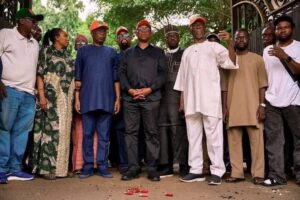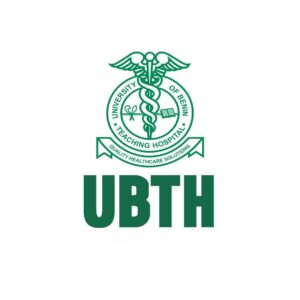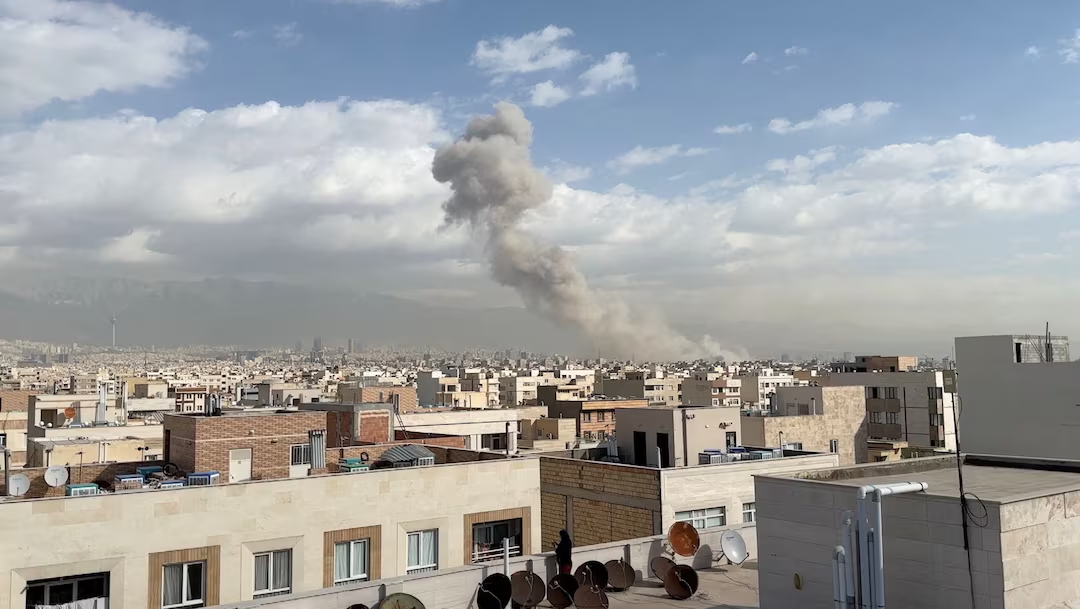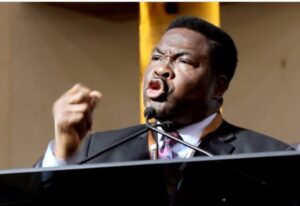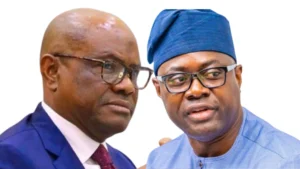Sarkozy’s Fall and The Global Quest for a Corruption-Free Government
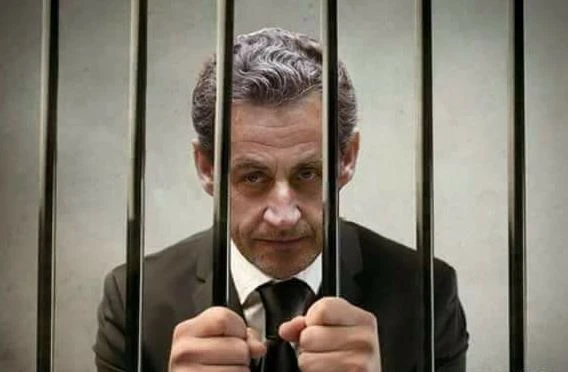
Jailed former French President, Sarkozy
By Orobosa Omo-Ojo JP
A Former President Behind Bars
In the pale morning light of October 21, 2025, the gates of La Santé Prison in Paris clanged shut behind a man who once strode the global stage with the swagger of power. Nicolas Sarkozy — former President of the French Republic, the man who commanded the Élysée Palace from 2007 to 2012 — had just begun serving a five-year jail sentence for criminal conspiracy.
It was a moment both historic and sobering. For the first time in modern French history, a former head of state was ordered to serve actual prison time for corruption-related crimes. The verdict, delivered weeks earlier by the Paris Correctional Court, concluded that Sarkozy conspired to obtain millions of euros in illegal campaign funding from the late Libyan dictator, Muammar Gaddafi, to bankroll his 2007 presidential campaign.
The case, stretching across nearly 15 years of investigations, denials and appeals, has now entered the annals of political reckoning — not just in France, but around the world.
Sarkozy’s lawyers insist he is innocent, dismissing the trial as “a political witch-hunt.” Yet, beyond the courtroom battles, the symbolism was impossible to ignore: France, one of the cradles of democracy, had just imprisoned its former president.
The Weight of Justice
The court’s 2025 ruling found Sarkozy guilty of association de malfaiteurs — criminal conspiracy — a charge that carries heavy moral and political weight.
Judges concluded that Sarkozy and a network of aides engaged in secret dealings with Libyan officials between 2005 and 2007. The objective was clear: secure millions in illicit cash to fuel his campaign machinery. While the court acquitted him of some charges due to lack of direct evidence of the funds’ transfer, the conspiracy verdict was damning enough.
He was sentenced to five years in prison (two suspended), fined €100,000, and barred from public office for five years. For a man once dubbed “the hyper-president,” whose charisma redefined French conservatism, the descent into infamy was absolute.
“I will appeal because this is an injustice,” Sarkozy told reporters before surrendering to authorities. Yet the larger message — that no one, however powerful, stands above the law — resonated far beyond the confines of Paris.
France Confronts Its Shadows
The Sarkozy saga is not an isolated scandal. France, for all its institutional sophistication, has wrestled for decades with political corruption. From the Elf Aquitaine oil scandal of the 1990s to illicit campaign financing cases involving mayors and ministers, the French justice system has often danced an uneasy waltz with political power.
But Sarkozy’s conviction stands apart. It tested the strength of France’s judicial independence against the entrenched privileges of its political elite.
The proceedings revealed the deep frustrations of a citizenry tired of opaque campaign finances, crony capitalism, and the blurring line between private gain and public duty. According to a 2025 Le Monde poll, more than 60 percent of French citizens said the case had “deepened their distrust” of politicians — even as they applauded the judiciary for acting firmly.
“Justice has shown it can rise above politics,” said Corinne Lepage, a former environment minister and anti-corruption campaigner. “But the battle is not over. Corruption does not vanish with one conviction; it mutates.”
The Anatomy of Corruption
Corruption is never just the crime of one man or woman. It is a systemic ailment — a web of relationships, incentives and silences.
Economists describe it as “the misuse of public office for private gain.” But in practice, it is far more corrosive: it erodes trust, distorts institutions, and breeds cynicism. Once corruption becomes normalized, it feeds a culture where citizens expect little from government — and officials expect little accountability from themselves.
In France’s case, despite strong institutions, loopholes persist. The 2016 Sapin II Law expanded corporate liability and whistle-blower protections, yet enforcement remains uneven. Transparency International’s 2024 Corruption Perceptions Index ranked France 21st — respectable, but stagnant. The Council of Europe’s GRECO body reported that France was still “only partly compliant” with reforms to prevent conflicts of interest in government.
The message is clear: even mature democracies struggle to root out corruption once it embeds itself in the fabric of political life.
What It Takes to Build a Corruption-Free Government
Is a corruption-free government truly possible?
Or is the phrase itself an illusion — a noble aspiration rather than an achievable reality?
Political scientists argue that corruption can never be entirely eradicated, only minimized through consistent, systemic effort. Successful countries, they note, combine strong institutions, transparent processes, independent oversight, and civic pressure.
Five pillars stand out:
- Law and Enforcement — Countries that punish corruption consistently, not selectively, build deterrence. Sarkozy’s sentencing sends such a signal.
- Transparency and Open Data—Governments that publish procurement details, contracts, and public spending leave less room for manipulation.
- Independent Oversight — Anti-corruption agencies, auditors and ombudsmen must be empowered — and shielded from political interference.
- Civic Engagement — Active citizens and free media form the social immune system against corruption.
- Political Will and Culture — Ultimately, institutions mirror leadership. When leaders tolerate graft, systems decay. When they reject it, integrity becomes contagious.
The Global Context: From Paris to Africa
For observers in Africa, Sarkozy’s conviction carries a sharp irony. Many post-colonial nations still battle corruption rooted in the very administrative traditions inherited from Europe. Yet, while France is holding a former president accountable, most African leaders accused of similar crimes remain unpunished — or even celebrated.
Nigeria, Africa’s largest democracy, has fought corruption for decades. Each government arrives with promises to “fight graft,” yet the stories rarely change. From oil subsidies to contract kickbacks, the cycle persists.
But the Sarkozy verdict offers a lesson: institutional courage matters more than rhetoric.
If French judges could convict a former head of state, why shouldn’t Nigerian courts do the same when evidence points toward wrongdoing, regardless of status?
As Transparency International notes, corruption costs developing nations an estimated $1 trillion annually in illicit outflows — funds that could build roads, schools, and hospitals. The result is not merely moral decay, but measurable poverty.
When the Powerful Fall
There is a reason why Sarkozy’s imprisonment electrified global headlines. It defied the pattern of impunity that often shields political elites.
His downfall follows a growing list of world leaders facing justice:
Luiz Inácio Lula da Silva of Brazil, jailed in 2018 before later cleared and re-elected.
Jacob Zuma of South Africa, imprisoned in 2021 for contempt of court amid corruption probes.
Silvio Berlusconi of Italy, convicted of tax fraud.
Park Geun-hye of South Korea, impeached and jailed for bribery.
Each case reflects a common truth — democracy without accountability is hollow.
For citizens, these moments are both unsettling and empowering: unsettling because they expose the rot in the system; empowering because they reaffirm that justice can, eventually, reach everyone.
France’s Cautionary Tale
Still, Sarkozy’s case also cautions against complacency. His conviction does not mean France is corruption-free; it means corruption has been confronted — at least this once.
Critics note that while Sarkozy faces jail, many of his associates remain untouched. Some question whether similar standards would apply if he still held political office or popular support.
Moreover, the French public’s disillusionment runs deeper than any single trial can heal. For decades, surveys have shown that citizens rank “political corruption” among the top three national concerns, just behind inflation and immigration.
The lesson for reformers is stark: accountability must become routine, not exceptional.
How Nigeria Can Draw from the Sarkozy Moment
Nigeria’s institutions have often shown flashes of resolve. The Economic and Financial Crimes Commission (EFCC), the Independent Corrupt Practices Commission (ICPC), and the Code of Conduct Bureau all exist to promote integrity. Yet, political interference, selective prosecution, and judicial delays have blunted their impact.
To move toward a truly corruption-resistant state, several practical lessons emerge:
- Strengthen Independence of Anti-Graft Bodies
Agencies must operate without fear or favour. Their leadership should be appointed through transparent, merit-based processes insulated from executive influence. - Ensure Judicial Integrity and Speed
Delayed justice emboldens corruption. Special anti-corruption courts with strict timelines could accelerate trials and signal seriousness. - Institutionalize Transparency in Procurement
Public contracts should be open for citizen monitoring. Digital platforms like the Open Contracting Portal should be enforced nationwide. - Empower Civil Society and Media
A free press and watchdog NGOs remain the first line of defence. Whistle-blower protections must be credible, not cosmetic. - Cultivate Political Culture of Accountability
Ethical governance cannot be legislated alone; it must be modelled. Political parties should expel members indicted for corruption instead of shielding them. - Leverage Technology and Data
E-governance platforms reduce human discretion in public service, minimizing bribery. Digitized payments, asset registers, and procurement databases enhance oversight. - Promote Civic Education
Corruption thrives where citizens expect little. Teaching values of public accountability — from schools to community associations — can reshape norms over time.
The Psychology of Power
Sociologists often say corruption flourishes not merely because of greed, but because of opportunity without consequence.
In Sarkozy’s world, campaign financing was a competitive arms race. Every euro meant media coverage, influence, and survival. That hunger for advantage, left unchecked by transparent systems, can turn even the ambitious into offenders.
In Nigeria’s context, where political office confers near-royal privilege, the temptation is even greater. Weak oversight allows campaign funds to blur into personal enrichment. As a result, politics becomes not a service, but an investment — one to be recouped once in power.
Breaking that cycle requires a moral reset — a collective understanding that leadership is stewardship, not conquest.
The Role of Citizens
Citizens often underestimate their role in curbing corruption. Yet history shows that public pressure can change systems faster than legislation.
In France, media investigations — particularly by Mediapart and Le Monde — kept the Sarkozy case alive long after prosecutors had slowed. In Brazil, citizen protests fuelled anti-corruption reforms. In South Korea, millions marched peacefully to demand Park Geun-hye’s impeachment.
Nigeria’s citizens possess the same power. Every viral video exposing a bribe, every journalist who follows the money, every youth who demands transparency — they all chip away at the culture of impunity.
A corruption-free government begins not in courts, but in the collective conscience of its people.
Beyond Punishment: Building Integrity
Punishment deters, but prevention sustains. True reform goes beyond imprisoning offenders; it builds systems that make corruption difficult and honesty rewarding.
Experts propose three long-term frameworks:
- Integrity by Design — embed accountability into institutional architecture. For instance, automate payrolls, standardize contract bidding, and digitize land registries.
- Incentivize Honesty — reward transparent departments with greater funding or autonomy.
- Normalize Whistle-blowing — create safe, anonymous, and rewarding mechanisms for exposing graft.
Integrity is not a sermon. It is structure, process, and constant vigilance.
From Paris to the World: A Ripple Effect
Sarkozy’s imprisonment has rippled through political circles worldwide. In Europe, it reinforces the notion that democracy’s credibility lies not in elections alone, but in accountability. In Africa, it serves as a reminder that independence without integrity breeds dysfunction.
Even within France, the verdict has sparked debate about political financing and foreign influence. President Emmanuel Macron, in a speech following the sentencing, called it “a painful but necessary lesson — that justice must remain blind, even when it sees a familiar face.”
What a Corruption-Free Government Would Look Like
Imagine a government where:
Every naira or euro spent is traceable online.
No public servant can hide unexplained wealth.
Campaigns are publicly funded, reducing private influence.
Citizens can access information without obstruction.
Courts deliver verdicts based on evidence, not status.
That vision is not utopian. Estonia, Denmark, and New Zealand show it can be done. These countries rank highest on integrity indices not because their people are morally superior, but because their systems leave little room for abuse.
Nigeria, and indeed France, can reach that standard — not overnight, but through relentless reform.
A Mirror for Every Nation
Nicolas Sarkozy’s fall is not merely a French story; it is a mirror held up to every government that claims to value democracy. It poses uncomfortable questions:
How transparent is our political financing?
Are our institutions strong enough to prosecute the powerful?
Do we reward integrity or cunning in public life?
For nations like Nigeria, still struggling to align promise with governance, the answers define the future.
The Price of Integrity
As the prison doors closed on Nicolas Sarkozy, France sent a message to the world: power may protect for a season, but not forever.
The fight for a corruption-free government is neither romantic nor simple. It is a daily grind of laws enforced, institutions strengthened, and values renewed. It requires courage — the kind that sees justice not as vengeance, but as restoration of trust.
For citizens everywhere, Sarkozy’s conviction should serve as both caution and inspiration: corruption may seem entrenched, but accountability, once awakened, can shake even the highest towers of power.
The challenge now is whether other nations — Nigeria among them — are willing to let justice ring that loudly.
Because in the end, democracy survives not on the strength of its elections, but on the integrity of those elected.



